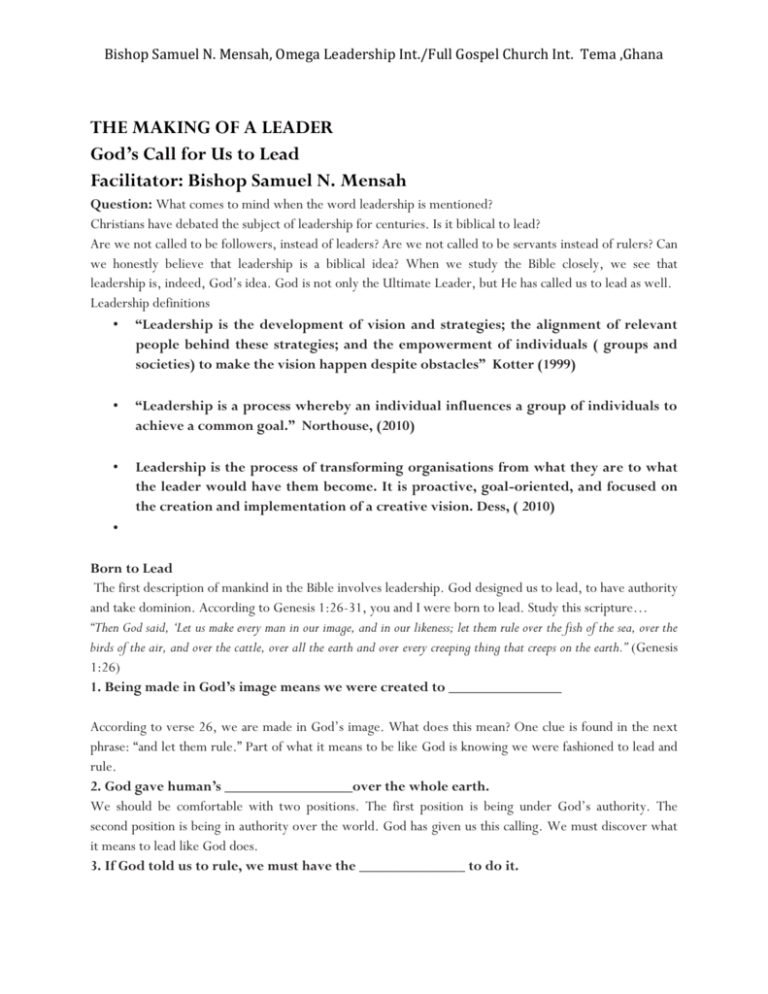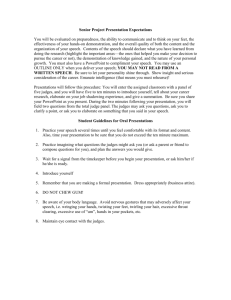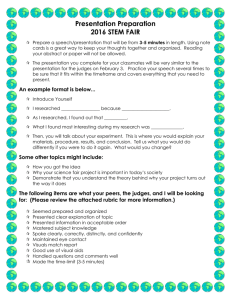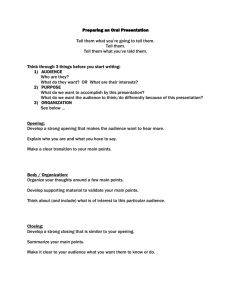The making of a Leader - Africa Association of Bible School
advertisement

Bishop Samuel N. Mensah, Omega Leadership Int./Full Gospel Church Int. Tema ,Ghana THE MAKING OF A LEADER God’s Call for Us to Lead Facilitator: Bishop Samuel N. Mensah Question: What comes to mind when the word leadership is mentioned? Christians have debated the subject of leadership for centuries. Is it biblical to lead? Are we not called to be followers, instead of leaders? Are we not called to be servants instead of rulers? Can we honestly believe that leadership is a biblical idea? When we study the Bible closely, we see that leadership is, indeed, God’s idea. God is not only the Ultimate Leader, but He has called us to lead as well. Leadership definitions • “Leadership is the development of vision and strategies; the alignment of relevant people behind these strategies; and the empowerment of individuals ( groups and societies) to make the vision happen despite obstacles” Kotter (1999) • “Leadership is a process whereby an individual influences a group of individuals to achieve a common goal.” Northouse, (2010) • Leadership is the process of transforming organisations from what they are to what the leader would have them become. It is proactive, goal-oriented, and focused on the creation and implementation of a creative vision. Dess, ( 2010) • Born to Lead The first description of mankind in the Bible involves leadership. God designed us to lead, to have authority and take dominion. According to Genesis 1:26-31, you and I were born to lead. Study this scripture… “Then God said, ‘Let us make every man in our image, and in our likeness; let them rule over the fish of the sea, over the birds of the air, and over the cattle, over all the earth and over every creeping thing that creeps on the earth.” (Genesis 1:26) 1. Being made in God’s image means we were created to _______________ According to verse 26, we are made in God’s image. What does this mean? One clue is found in the next phrase: “and let them rule.” Part of what it means to be like God is knowing we were fashioned to lead and rule. 2. God gave human’s _________________over the whole earth. We should be comfortable with two positions. The first position is being under God’s authority. The second position is being in authority over the world. God has given us this calling. We must discover what it means to lead like God does. 3. If God told us to rule, we must have the ______________ to do it. Bishop Samuel N. Mensah, Omega Leadership Int./Full Gospel Church Int. Tema ,Ghana God never commands us to do anything without enabling us to do it. You and I have the ability to lead because God created us and commanded us to do so. Based on your gifts and personality, you have the ability to lead in some area. Being Salt and Light (Why and How God Calls Us to Lead) “Let us make man in our image... and let him rule.” (Genesis 1:26) In the New Testament, God confirms this calling to influence others. Look at Matthew 5:13-16: “You are the salt of the earth; but if the salt has become tasteless, how can it be made salty again? …You are the light of the world. A city set on a hill cannot be hidden. Nor do men light a lamp, and put it under a basket, but on a lamp stand; and it gives light to all who are in the house. So, let your light shine before men in such a way that they may see your good work, and glorify your Father who is in heaven.” Salt influences the food we eat. Light influences the homes in which we live. Jesus is calling us to embrace our calling to influence, and shine wherever we go. The Apostle Paul took this calling seriously when he said: “Therefore, knowing the fear of God, we persuade men…” (2 Corinthians 5:11) Divine Permission to Lead Many of us feel like Moses did when he faced God at the burning bush, in Exodus 3-4. He felt inadequate and unprepared to lead. But that’s what God called him to do. Many potential leaders in the Bible were afraid and ran from their call. God had to give them permission to do it. Most of us can list why we don’t lead effectively, just as Moses did. When God called him, he instantly had five excuses why he couldn’t lead. Notice how God responds to them. Excuse One: Who am I? (Exodus 3:11) Moses struggled with his identity. He just didn’t feel qualified. He thought God picked the wrong leader. God’s response: It doesn’t matter who you are. I’ve called you. I am with you. Excuse Two: Who are you? (Exodus 3:13) Moses struggled with intimacy. He didn’t know God well enough to describe Him to the people. His relationship with God was weak. God’s response: I AM WHO I AM. I’m anything you need. Excuse Three: What if they don’t listen? (Exodus 4:1) Moses struggled with intimidation. He worried about people’s reaction to him. God’s response: When I am finished, they’ll listen. Trust me. Excuse Four: I’ve never been a good speaker. (Exodus 4:10) Moses struggled with inadequacy. Who would follow him if he couldn’t speak well? God’s response: Guess who made your mouth? I’m the source of your gifts. Excuse Five: I know you can find someone else. (Exodus 4:13) Moses struggled with inferiority. He compared himself with other more competent people, and he felt inferior. God’s response: OK, I will let Aaron go with you…but I’m still calling you. QUESTION: What excuses do you have for not leading well? What do you believe God’s response might be? Bishop Samuel N. Mensah, Omega Leadership Int./Full Gospel Church Int. Tema ,Ghana _________________________________________________________________ _________________________________________________________________ Leadership Is Influence J. Oswald Sanders said it first. Leadership is influence. Nothing more. Nothing less. It is about influencing others in a worthwhile cause. It is not dependent on titles or positions. It is dependent on someone catching a vision from God, and mobilizing others to join them in its fulfillment. When this happens, leadership arises in its purest form. It happens to every organization at one point or another, especially when there’s no system or plan. In those times, there is no expectation of progress. Today, many regions of the world are crying for godly, effective leaders. The leader must earn the right to lead and others choose to follow. The Period of the Judges Before Israel adopted a monarchy and Saul was appointed to be their king, they experienced an era of time called the period of the Judges. It was a season when pure leadership was required. Every judge that led was a pioneer. The following verse appears more than once in the book of Judges: “And there was no king in Israel in those days, and every man did that which was right in his own eyes.” (Judges 21:25) Here are six reasons why this period was a leadership intensive season: 1. Chaos reigned because there was no precedent for AUTHORITY or ACCOUNTABILITY. 2. Since the Jews first occupied Canaan, aggressive ENEMIES surrounded them. 3. There were no government FUNDS for national defense or safety. 4. Other NATIONS influenced Israel with their idols and superstitions. 5. Heroes like Moses and Joshua were DEAD and there was no EXPECTATION of order. 6. Momentum and morale were LOW, so growth was hard not easy. Fourteen judges led Israel during this period. Each leader started his/her leadership role from scratch. These are the ones we know about: Othniel, Ehud, Shamgar, Deborah, Gideon, Abimelech, Jiar, Tola, Jephthath, Ibzan, Alon, Abdon, Samson and Samuel. Certainly, we know more about some of these judges than others. However, from the text we can summarize how effective leaders led during Israel’s most difficult season. During these times, leaders must go back to the basics. The basics are clear during this period in Israel’s history. The judges had the following characteristics in common. The Basics of Effective Leaders: 1. ___________________________________ Contrary to what many think about leadership today, during this time leadership always began with a need. In Judges, it didn’t start when someone wanted to fill an empty position. There were no positions to fill. There was no protocol or structure at all. There was no vote for deacons or Sunday school teachers. If you led it was because you saw a need and got others to help you meet it. All the judges started their leadership journey when they saw a specific problem they could address. OTHNIEL: Found Israel surrounded by Mesopotamia. He stepped forward to recruit and lead an army of Hebrews against the king. He prevailed. This led to40 years of peace. Bishop Samuel N. Mensah, Omega Leadership Int./Full Gospel Church Int. Tema ,Ghana EHUD: Observed the Moabites dominating his people, and decided he’d had enough. He led Israel to a rousing victory over Moab. This led to 80 years of peace. SHAMGAR: Stepped forward when the Philistines had oppressed Israel for years. When he personally struck down 600 soldiers, he inspired his army to victory. When Leadership Is Genuine When. . . a. It always starts with a need. b. That need sparks passion within a person. c. That person acts in response to the need. d. This action moves others to cooperate. APPLICATION: When you hear the many needs around you, which one strikes a cord within your heart? What kind of “specialist” are you called to become? What will you do before you die? What will be your significant contribution? 2. ____________________________ In each case in Judges, a leader emerged because they had an obvious gift. They possessed some ability that fit the need of the moment perfectly. They were competent in a relevant arena. Their gift solved a problem. In each case, the “gift” was from God, but took on different forms. It was: a. A Spiritual Gift: Samson had a spiritual gift connected to his Nazarite vow. b. A Natural Talent: Deborah had a natural talent for strategy and wisdom. c. An Acquired Skill: Gideon and Jephthath developed their skills to lead over time. God has put something inside each of us that is to be delivered to the people around them. In other words, everyone has something we all need. When we find it, we naturally influence. When Leadership Is Genuine . . . a. A person finds a __________ inside of them. b. They groom and _____________ that gift. c. They eventually match that gift with a place of _______________ d. The gift provides a platform for ________________ e. They eventually flourish because of their _____________. We Naturally Lead in the Area of Our Gift. In Our Gift Area, We Are Most… * Intuitive * Satisfied * Productive * Natural * Comfortable * Influential APPLICATION: How about you? What is your primary gift? What contribution do you make to the body of Christ, that would be most missed if you were gone? What do you add to your organization that you do best? 3. ______________________________ When an outward need and an inward gift match, the leader often follows by becoming consumed with a passion. This passion is compelling to others; the leader can’t help but share it with those who want to get involved. In the book of Judges, several leaders experienced this kind of inward chemistry that sparks passion. Here are the ingredients for passion: Bishop Samuel N. Mensah, Omega Leadership Int./Full Gospel Church Int. Tema ,Ghana Passion Comes When a Leader Has Complementary… 1. _________________- Your interests and concerns 2. _________________ - Your values, principles and beliefs 3. _________________ - Your God-given abilities 4. _________________ - Your desperate circumstances 5. _________________ - Your occasion to get involved Passion makes up for a lack of resources. No doubt, resources are nice to have, but many of the Judges were not rich in money, people or talent when they started. Gideon was scared. Samson lacked a moral backbone. Jephthath was impetuous. Abimelech got over- zealous and had to be reprimanded. It appears that Ibzan, Elon, and Abdon might have been elderly. This doesn’t stop people if they have passion. APPLICATION: Passion generally begins with interests. What are your interests as they relate to leadership and needs around you? What makes you cry or makes you angry? What do you feel strongly about that you often feel driven to act? 4. __________________________ True leaders eventually come to the point where they attract and empower others to their passion. Sometimes, they just find others who share the same passion. One thing is sure, genuine leaders connect with others. This is what separates an entrepreneur and a leader. Leaders don’t act alone. They have followers. They have to, because they have a cause that’s bigger than they are. They need others to pull it off. GIDEON: Gideon was told to gather an army and attack the Midianites. He recruited too many men and God had to trim the size of his army or he might take credit for the win! This leader persuaded too many people to follow! If only we had the same problem. DEBORAH: Although she was a woman, Israel was fully persuaded by Deborah. Whatever she determined to do, the people followed. Barak even insisted she go with him to battle. He understood who had influence. SAMUEL: The strongest of all the Judges, Samuel, was the most influential leader, between the time of Moses and David. His leadership spanned two generations. Both old and young listened to him. Even kings looked up to him. He anointed Saul and David as kings. He was a leader of leaders. Proven Practices for Getting Things Done . . . 1. What gets talked about gets done. 2. What gets trained for gets done. 3. What gets measured gets done. 4. What gets budgeted gets done. 5. What gets confronted gets done. 6. What gets rewarded gets done. Bishop Samuel N. Mensah, Omega Leadership Int./Full Gospel Church Int. Tema ,Ghana APPLICATION: How about you? Who has bought into your leadership 100%? Who do you persuade? Is it the old or the young? Are they leaders or followers? How do you persuade people to take the journey with you? When do you influence others? Where do you influence them? 5. ______________________________ A final observation is that every Judge could lead because they followed a distinct purpose laid out before them. They moved in a direction to reach a specific goal. No judge desired only to maintain status quo. Each felt they had a divine assignment to be performed. You might call it their life purpose. It became a consuming accountability partner. It would be difficult to separate leadership from purpose. I cannot imagine leading without a clear sense of a God-given purpose. Perhaps this is why so many churches fail to bear fruit. There is no clear, defined, agreed upon mission. In Judges, Their Purpose Was… 1. Personal: It fit their gifts and passions. 2. Measurable: It involved activity that could be evaluated. 3. Memorable: It was specific enough to be remembered and embraced. 4. Meaningful: It surrounded national issues that made a difference. 5. Mobile: It could travel with them wherever they found themselves. 6. Moral: It was right. They felt it not only could be done but should be done. DEBORAH: Her sole purpose was to liberate Israel from the Caananites. She laid out a plan, provided the resources, commissioned Barak to lead the army, and when he refused to lead the attack alone, she went with him. ASSESSMENT: Do you follow your purpose? How do you compare to the list? _________________________________________________________________ _________________________________________________________________ APPLICATION: What is your clear purpose? Have you defined it? Do the key people in your organization agree upon what it is and how it should be pursued? _________________________________________________________________ _________________________________________________________________ Self Evaluation: The Five Characteristics of a Leader from Judges… 1. They Perceive a Need 1 2 3 4 5 6 7 8 9 10 2. They Possess a Gift 1 2 3 4 5 6 7 8 9 10 3. They Parade a Passion 1 2 3 4 5 6 7 8 9 10 4. They Persuade a People 1 2 3 4 5 6 7 8 9 10 5. They Pursue a Purpose 1 2 3 4 5 6 7 8 9 10 Source: Equip, John Maxwell






